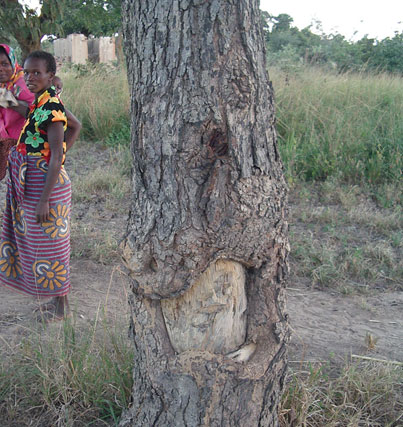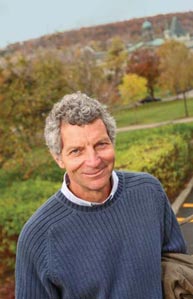As migration, a burgeoning ecotourism industry, and even the growing international conservation movement have stepped up pressure on the land and its people, concern over environmental fallout in Zambia and Kenya is increasing—but a solution may lie in a new way of thinking about land tenure.
By Andy Blatchford

Over half of Zambia’s estimated 12 million people live outside urban centres—and, with low-to-none net rural out-migration, issues surrounding rural land use remain extremely germane to many Zambians. Case in point: the country’s southern woodlands on the outskirts of Kafue National Park. There, black rhinoceros, wild dogs and elephants have found a place to feed. Humans have found something in those woods, too. Clinging to the hope of starting a new life, migrants from the overpopulated and severely degraded lands around Lake Kariba, which straddles Zambia and Zimbabwe, have been flooding into the region. As each year brings more people, the natural haven is being consumed.
What is, on the surface, an ecological issue has unexpected roots: land tenure policy, or the rules governing who has the right to occupy a specified area. The Kafue region, like much of rural Zambia, is divided into chiefdoms in which chiefs and their headmen allocate land to would-be settlers. Settlement cannot occur without this approval, but the headmen are often inconsistent in their methods, applying different rules to different groups of applicants. An indigenous farmer, for example, might be given land whenever it is needed, while a migrant farmer may only receive a one-time allocation of land.
Having successfully gained access to land, settlers still don’t “own” it—in the traditional Zambian mindset, land isn’t a commodity—but indigenous settlers generally feel secure in their holdings. Their migrant counterparts, on the other hand, live in the very real fear that the headmen will subdivide, and reallocate, property they believe is unused. Subdividing properties increases a chiefdom’s population, which boosts the chief’s power on the Zambian government’s Council of Chiefs—and, with large numbers of migrants entering the Kafue region, there is no shortage of potential settlers eager to snatch up these newly liberated plots. Migrant settlers are therefore anxious about ceding portions of their land to other newcomers—so anxious, in fact, that they’re driven to the extreme measure of hacking down all their trees to show every inch of the plot is needed, even when it’s not. The deforestation resulting from “clearing to claim” has helped make Zambia the country with the fourth largest annual net loss in forest area, according to the UN’s Global Forest Resources Assessment 2005. In the vicinity of Kafue National Park, such deforestation decimates the habitats of already endangered species, such as the wild dog and black rhino.

“A significantly large percentage of total deforestation is due to what we call tenure insecurity,” says Jon Unruh, an associate professor of human geography specializing in international development. Unruh also sits on the Zambian Association of Geographic Information Systems, a group of university researchers and government officials which offers input into the Ministry of Lands’ reconstitution of land tenure policy. “The question is, what form of tenure security for migrants might exist other than clearing to claim?”
There’s a philosophical gap between Western formal land law and customary or indigenous property rights, he says, that makes solving tenure insecurity a lot more complicated than handing out titles. “In Africa and the Middle East, the notion that land is a buyable or sellable thing doesn’t connect. Land tenure there is not based on paper titles, registries and ‘proper channels.’ It is based on complicated things like world view, culture, identity, food security, personal security and group belonging.” A Kenyan research project, conducted over several years, found that handing out titles did not lead to privatized holdings or the flourishing of a Western-style land market. “We’ve learned that superimposing titles on the land doesn’t work,” Unruh says. “This Western idea of a land title really isn’t all it’s cracked up to be in terms of solving large social problems. Titles are meaningless unless an entire land system is in place, and widely accepted by the population. The communal system of land economy can’t be changed simply by handing out pieces of paper.”
Working with colleagues at the University of Zambia and Uganda’s Makerere University, Unruh is searching for “middle-ground ways that an outside settler and the local community, which holds the land, can both find security in the land tenure arrangement.” Unruh’s team conducted a rural household survey of more than 600 randomly selected migrant and non-migrant households, looking at land tenure security and the different kinds of evidence held, presented and needed for making and retaining claims to land. He’s hopeful that a hybridized form of land tenure, which incorporates indigenous and formal law, could be the system of the future. In this model, land allocation would still be approved by chiefs and headmen, but there would also be an opening for the state to settle disputes. “It would add an extra degree of security, and subtract a degree of capriciousness from the whole arrangement, so there’s something other than just the headman’s feeling, from one day to another, about whether you’re going to keep your land.
“Such an arrangement needs to be enticing for the local leadership, and in step with customary ways of dealing with identity and relationship to the land,” he explains. “At the same time, there needs to be a state presence—but if the state is too heavy-handed, the chiefs will disengage. It’s a difficult balance.”

On the eastern side of the continent, McGill researchers are also taking a close look at the effects of land tenure on the usage and conservation of environmental resources. Research pursued over the last decade by John Galaty, professor in McGill’s Department of Anthropology, has shown that two innovations in land holding have had significant effects on the last 20 years of wildlife conservation in the rangelands of Kenya.
The first factor: subdivision. Many relatively large group ranches, held by communities, have been subdivided into family holdings; this fracturing results in increased crop cultivation (and, consequently, a reduction in grazing lands) and fencing (disrupting the free movement of wildlife). Galaty observes a conflict between reducing land holdings to smaller parcels and ensuring rancher-pastoralists the flexibility to move their livestock across sufficiently large areas of land to accommodate the extreme variation in rainfall found in Africa’s drylands. For this reason, larger-scale ranches tend to be more self-sufficient, producing better results in livestock production and less environmental damage. “As subdivision occurs and people are using smaller and smaller parcels,” he says, “degradation tends to follow.”
With the help of McGill doctoral students, Galaty has studied what happens when complaints arise after land is allocated among group ranch members, then sold to outsiders. The researchers discovered how, in the absence of disinterested government oversight, the local committees that oversee subdivision are readily bribed to favour outsiders or politically influential people over local herders. “It’s been terribly disruptive in terms of land holding, in terms of conservation, in terms of the local economy.”
Subdividing group lands has also created sub-economic units that are simply too small. “They’re ecologically unstable or insufficient,” Galaty says. “As much as they are able to keep these ranches undivided, the better off they will be.”

At the same time that the government was encouraging subdividing, many individual and group holdings were converted into wildlife trusts, providing more expansive areas for wildlife migration and facilitating the participation of communities in conservation and tourism. Ecotourist companies and international conservation groups, such as the World Wildlife Fund, forged agreements with community conservation groups that provided communities with revenues, support for community projects, jobs and tourist infrastructure (such as tent-camps, lodges, roads for game-viewing).
The Kenya Wildlife Service manages protected areas, but is also responsible for wildlife wherever it is found. Thomas Meredith, associate professor in McGill’s Department of Geography and director of the undergraduate Canadian Field Studies in Africa program (see story), points out that, in principle, the KWS is guided by conservation principles consistent with international scientific norms, and its programs tend to focus on national and global objectives. But, Meredith stresses, programs must be managed “on the ground,” where local objectives are important. Local needs and expectations can vary considerably, presenting real challenges for wildlife managers. For example, pastoralists bear the burden of human-wildlife conflicts: protected wildlife cannot be fully confined to the parks, threatening crops, livestock, property and people when it wanders into settled areas. “Elephants cause the most damage to crops, but predatory animals—lions particularly—will kill domestic animals and injure people,” Meredith says. “It’s a very significant cause of potential conflict and it can mean very real losses to the people who have what they see as an historic right to the land.” What’s more, pastoralists receive little or no compensation for their losses, and—although there is some ecotourism revenue-sharing—they may enjoy few benefits from wildlife conservation and tourism. Meredith observes that if more of the profits from tourism were allowed to reach locals, those living on intensively used agricultural plots or pastoral holdings would lend stronger support to the ecotourism industry and the conservation movement. His graduate and undergraduate students have been examining damage to farmland, mitigation for losses and how best to involve locals in decision-making processes for land use, property access and resource issues.
“I think our work could help reduce the conflict between the people who feel that they’re victims of the conservation agenda and people who recognize that there are real benefits of having successful conservation programs in Kenya,” he says. “The local inequity of the distribution of resources is increasingly evident and, I think, increasingly volatile.”
This research is funded by the United States National Science Foundation, the Social Sciences and Humanities Research Council of Canada, the Fonds de la recherche en santé du Québec and the Fonds pour la formation de chercheurs et l’aide à la recherche.
